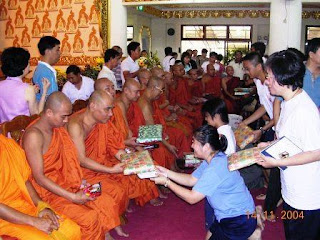Religious tolerance

The Buddha’s freedom of thoughts and religious tolerance are astonishing to the student of history of religions. Once in Nalanda, a famous householder named Upali was expressly sent by his teacher Mahavira to meet the Buddha and defeat him in argument on certain points in the theory of Karma, because the Buddha’s views on the subject were different from those of Mahavira’s.
Quite contrary to expectations, Upali, at the end of the discussion, was convinced that the views of the Buddha were right and those of his master were incorrect. So he requested the Buddha to accept him as one of his disciples, but the Buddha asked him to reconsider it and not to be in a hurry, “for considering carefully is good for well known men like you.” When Upali expressed his desire again, the Buddha requested him to continue respecting and supporting his old religious teachers as he used to.
In the third century B.C. the great Buddhist King Asoka of India following this noble example of tolerance and understanding honoured and supported all other religions in his vast empire. In one of his edicts carved on the rock, the original of which one may read even today, the king declared: -
“One should not only honour one’s own religion and condemn the other religions, but one should honour other religions for this or that reason. So doing, one helps one’s own religion to grow and render service to the other religions too. In acting otherwise, one digs the grave of one’s own religion and also does harm to other religions. Whatsoever honour his religion and condemn others’ religions does not indeed through devotion to his own religion, thinking ‘I will glorify my own religion.’ But on the contrary in doing so, he injures his own religion more gravely."
Therefore, religious tolerance is healthy. Let all listen and be willing to listen to the doctrines professed by others.
Quite contrary to expectations, Upali, at the end of the discussion, was convinced that the views of the Buddha were right and those of his master were incorrect. So he requested the Buddha to accept him as one of his disciples, but the Buddha asked him to reconsider it and not to be in a hurry, “for considering carefully is good for well known men like you.” When Upali expressed his desire again, the Buddha requested him to continue respecting and supporting his old religious teachers as he used to.
In the third century B.C. the great Buddhist King Asoka of India following this noble example of tolerance and understanding honoured and supported all other religions in his vast empire. In one of his edicts carved on the rock, the original of which one may read even today, the king declared: -
“One should not only honour one’s own religion and condemn the other religions, but one should honour other religions for this or that reason. So doing, one helps one’s own religion to grow and render service to the other religions too. In acting otherwise, one digs the grave of one’s own religion and also does harm to other religions. Whatsoever honour his religion and condemn others’ religions does not indeed through devotion to his own religion, thinking ‘I will glorify my own religion.’ But on the contrary in doing so, he injures his own religion more gravely."
Therefore, religious tolerance is healthy. Let all listen and be willing to listen to the doctrines professed by others.



Comments
Thanks for your view and comments.
By the way, hope to see your comments and feedback again.
Sorry as i did not update it regularly.